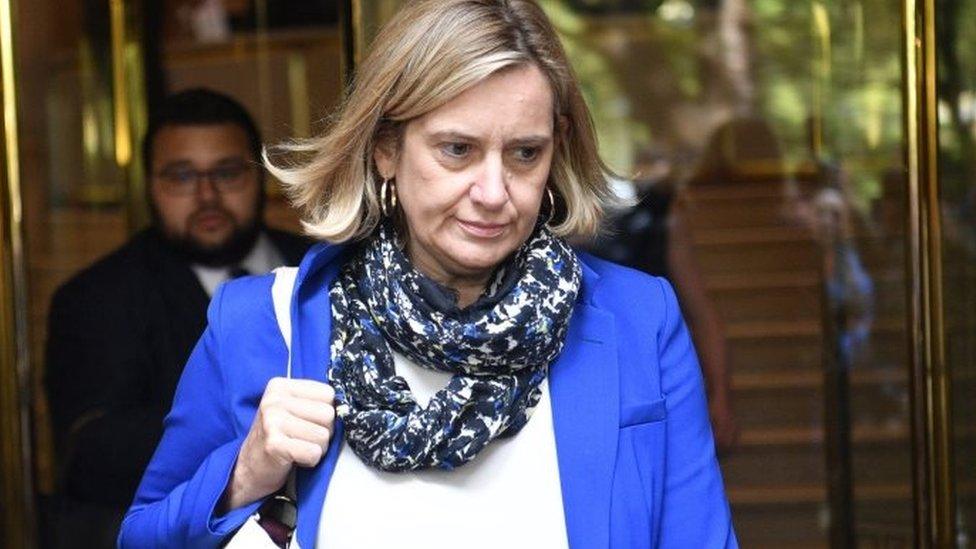Amber Rudd accuses Number 10 of language that 'incites violence'
- Published

Former cabinet minister Amber Rudd has accused Downing Street of using language that could "incite violence".
The MP, who quit the Conservative parliamentary party earlier this month, told the Evening Standard, external No 10's recent words were seen to encourage a "more aggressive approach".
It follows a stormy week, in which several MPs criticised the PM's use of language during Commons debates.
Boris Johnson has insisted he "deplores any threats to anybody".
Speaking on a visit to the Prince Alexandra Hospital in Harlow, Essex, where he announced £200m extra for NHS cancer-screening equipment, he said any intimidation of MPs was "appalling".
On Thursday, the PM's chief adviser Dominic Cummings said the anger directed against politicians was "not surprising".
The former Vote Leave campaign director said the only way to end the problem would be for MPs to "respect" the result of the EU referendum and implement Brexit.
The parliamentary tensions have led 120 archbishops and bishops to warn against "further entrenching our divisions".
In her interview with the Evening Standard, Ms Rudd, the former home secretary and work and pensions secretary, said: "The sort of language I'm afraid we've seen more and more of coming out from Number 10 does incite violence.
"It's the sort of language people think legitimises a more aggressive approach and sometimes violence."
Labour MP Karl Turner confronts PM's adviser Dominic Cummings
On Wednesday, Labour's Paula Sherriff referred to Jo Cox, the MP murdered in 2016, as she pleaded with the prime minister to refrain from using "dangerous" words like "surrender".
Mr Johnson described her intervention as "humbug".
The prime minister was also repeatedly challenged over his use of the words "surrender bill" and "surrender act" to describe legislation passed earlier this month which aims to block a no-deal Brexit on 31 October.
He went on to say that "the best way to honour the memory of Jo Cox and indeed the best way to bring this country together would be, I think, to get Brexit done".
Several MPs said the prime minister should apologise for this comment during a further debate on Thursday.
The Commons also heard of threats faced by politicians, with independent MP Caroline Nokes describing how someone had called her a "traitor who deserved to be shot" on a walkabout in her constituency.
Ms Rudd told the Evening Standard she had been "disappointed and stunned" when Mr Johnson dismissed "genuine fear that a lot of women have" following the 2016 murder of Mrs Cox.
She said that the "casual approach to safety of MPs and their staff is immoral".
She said Mr Johnson's rhetoric was "reminiscent" of Donald Trump leading chants of "lock her up" in the 2016 presidential race, which referred to rival Hillary Clinton.
In interviews with the BBC, Mr Johnson acknowledged that "tempers need to come down" in Parliament.
But he added: "I do think in the House of Commons it is important I should be able to talk about the surrender bill, the surrender act, in the way that I did."